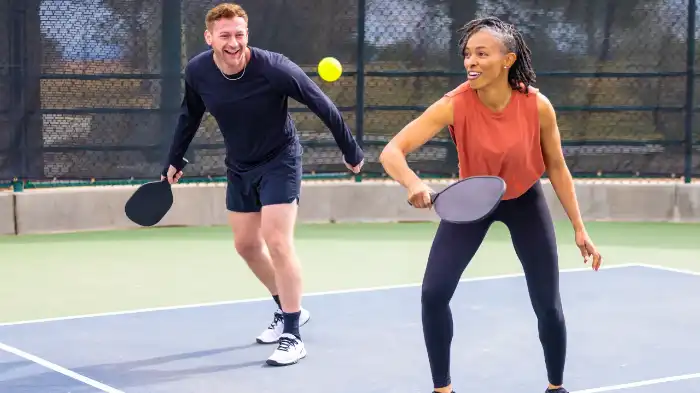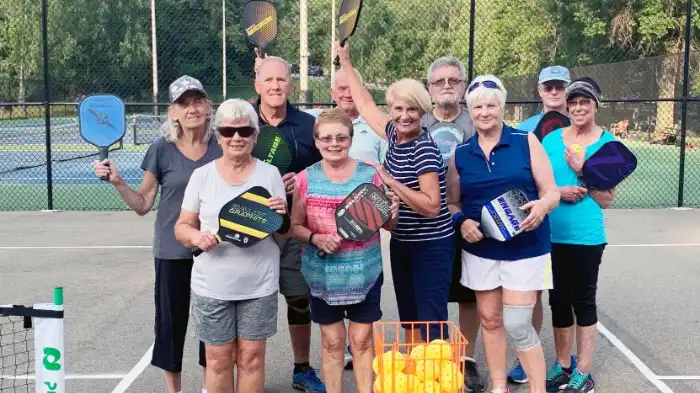Pickleball is a fast-growing sport that combines elements of tennis, badminton, and table tennis. It is played with a paddle and a plastic ball on a court similar to a badminton court. While pickleball can be played in singles, it is more commonly played in doubles, emphasizing the importance of teamwork and communication in the game. In this blog, we will discuss How Does Teamwork and Communication Play a Role in Pickleball, enhancing the overall gameplay experience.
How Does Teamwork and Communication Play a Role in Pickleball?
When it comes to, How Does Teamwork and Communication Play a Role in Pickleball? It is very necessary for all the players to know that Teamwork is crucial in pickleball, as it requires coordinated efforts between partners to win matches. By working together, teammates can capitalize on each other’s strengths and cover each other’s weaknesses. Here are a few ways teamwork is essential in pickleball.

Shared Court Coverage
One of the primary aspects of pickleball teamwork is shared court coverage. Since the court is relatively small, players need to communicate and move efficiently to cover the entire court. Each player has a specific assigned area, but they must also be ready to move to other areas when necessary. Effective communication enables players to adjust their positions and ensure that there are no gaps in their defense.
For example, if an opponent hits a shot that pulls one player out of position, their partner needs to quickly adjust and move to cover the vacated area. Without good communication, confusion can occur, leading to missed shots or leaving the court open for opponents to exploit.
Strategic Shot Placement
Another aspect where teamwork comes into play is strategic shot placement. When players communicate effectively, they can execute well-placed shots that put their opponents at a disadvantage. By discussing their intentions before each shot, players can set their partner up for success.
For instance, one player may intentionally hit a shot closer to the net, forcing the opponents to move forward. The other player, anticipating this shot, can then take advantage of the opponent’s position by hitting a deep shot to the back of the court, making it difficult for the opponents to reach and return the ball effectively.
The Role of Communication in Pickleball
In addition to teamwork, effective communication between teammates is crucial in pickleball. Communication helps players stay in sync, anticipate each other’s movements, and make split-second decisions. Let’s explore a few ways communication influences the game.
Calling Shots
Clear and concise communication is essential when calling shots in pickleball. Players need to communicate clearly to avoid confusion and ensure that both partners are aware of who is taking the shot. Words like “mine” or “yours” are commonly used to indicate who will be hitting the ball.
Calling shots also prevents unwanted collisions between teammates. By verbally claiming a shot, players can avoid accidentally colliding with each other while going for the same ball. This contributes to a smoother and safer gameplay experience.

Providing Encouragement and Support
Good communication in pickleball extends beyond shot calling. It is also essential for teammates to provide encouragement and support to each other during the game. Pickleball can be a mentally challenging sport, especially during competitive matches where the pressure is high.
By communicating positively and providing feedback, players can help keep each other motivated and focused. Simple gestures like giving high-fives, offering words of encouragement, or acknowledging good plays can go a long way in boosting team morale and maintaining a positive atmosphere on the court.
Conclusion
In conclusion of How Does Teamwork and Communication Play a Role in Pickleball, teamwork and communication are indispensable elements of pickleball. The sport heavily relies on coordinated efforts, shared court coverage, and strategic shot placement to win matches.
Effective communication facilitates proper shot calling, eliminates confusion, and enhances overall gameplay experience. By working together and establishing clear lines of communication, players can maximize their potential and take their pickleball skills to the next level.
Frequently Asked Questions
A: Teamwork is crucial in pickleball, as it allows players to coordinate their movements and strategies effectively. By communicating with each other and working together, teammates can cover more court ground, perform better shot selection, and achieve a higher level of synergy, leading to a greater chance of winning matches.
A: Communication is vital in pickleball because it helps players stay synchronized and make informed decisions on the court. By effectively communicating their intentions, players can avoid collisions, better plan their shots and strategies, and adapt to changing game situations, ultimately enhancing their overall performance.
A: Good communication skills foster effective teamwork in pickleball by ensuring all team members are on the same page. Clear and concise communication helps players anticipate each other’s moves, cover the court effectively, create winning strategies, and maintain a positive environment, leading to improved cohesion and better results on the court.
A: Yes, poor teamwork and communication can significantly hinder performance in pickleball. Lack of coordination and miscommunication may result in unforced errors, missed shots, confusion, and decreased morale. It is essential for players to cultivate strong teamwork and communication skills to maximize their potential and boost their chances of success.
A: Teammates can develop their teamwork and communication skills in pickleball through practice, open and honest dialogue, and fostering a supportive team environment. Regularly practicing together allows players to understand each other’s strengths, weaknesses, and playing styles, while effective communication can be improved through clear feedback, active listening, and shared strategic discussions.

